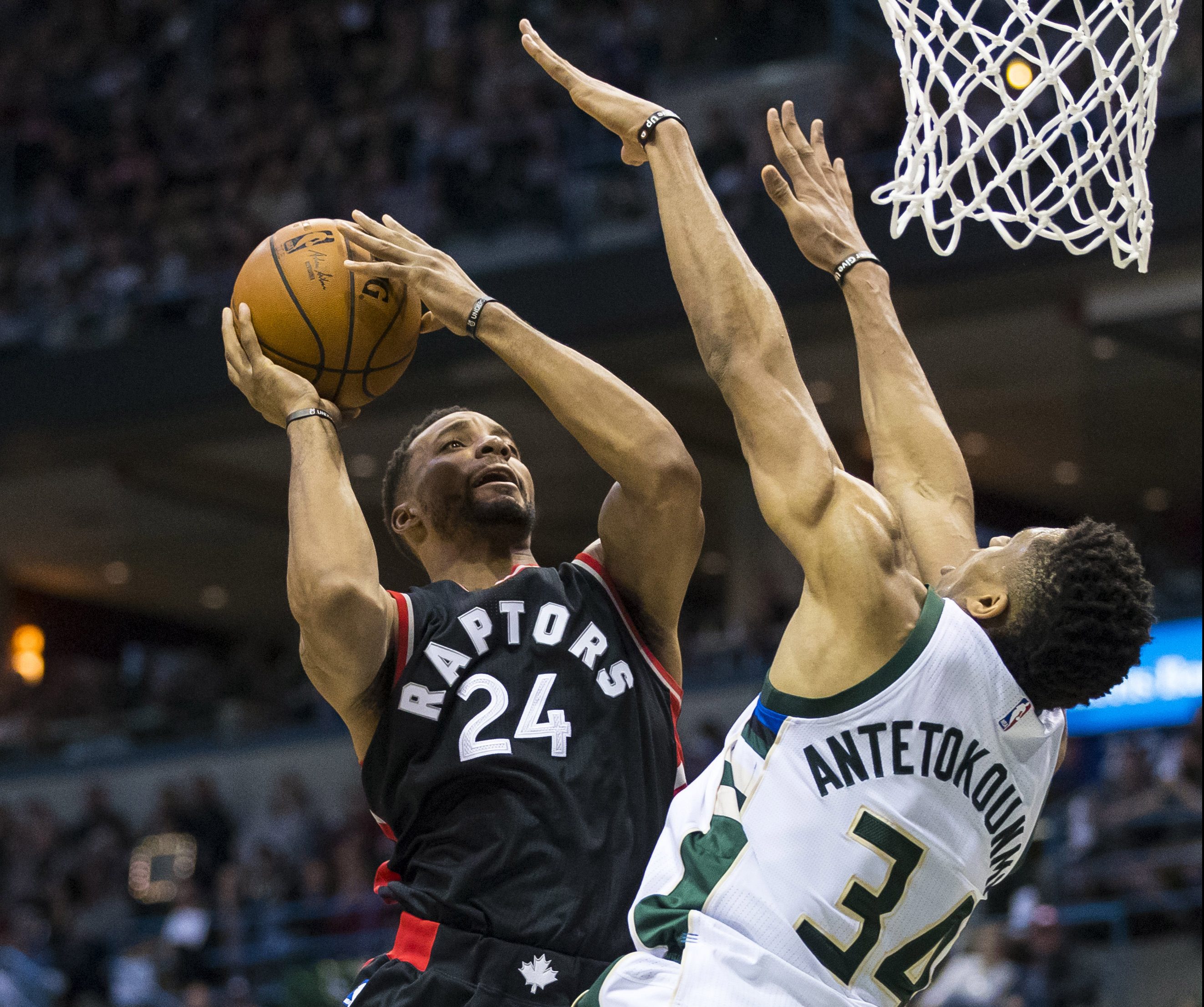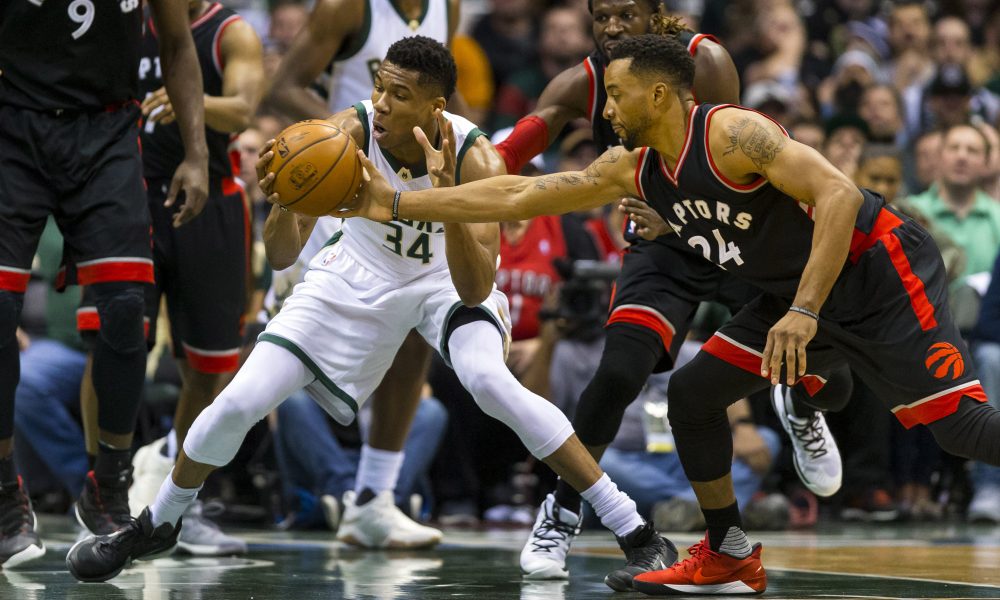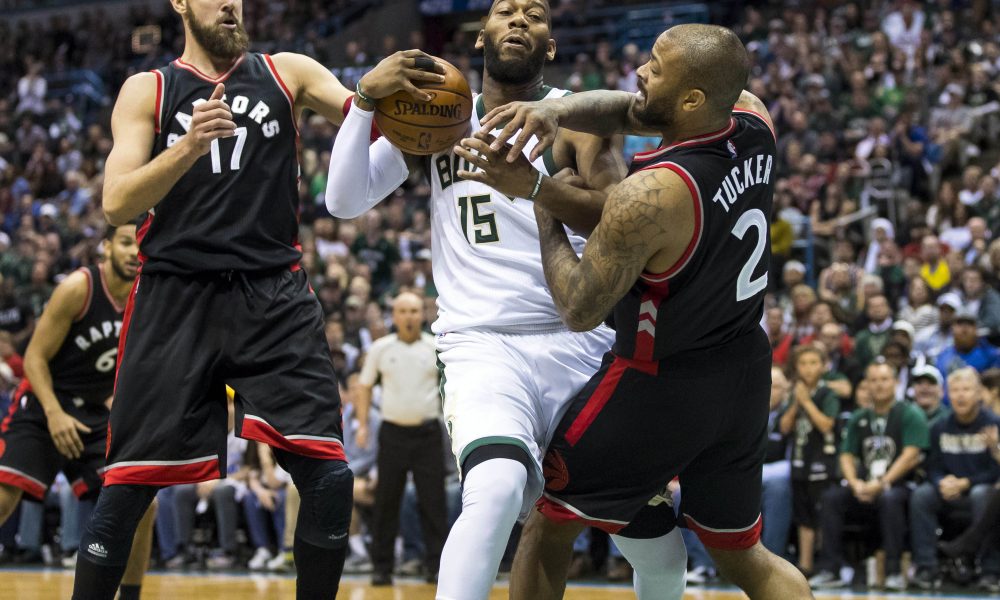Outside of the lines, Norman Powell’s demeanor is unflinching. Dialed in to video study on an iPad, posting pictures with his dog Apollo, or giving Fred VanVleet and Delon Wright a hard time, Powell’s stoic expressions do not betray what boils beneath the surface. Success or failure, large role or small, starting or DNP-CD, Powell’s face offers nothing.
When the ball’s rolled in and Powell hits the floor, though, he becomes a much easier read. The deadpan gives way to a howl after a dunk, to a head-nod after a stop, or, as has often been the case since the All-Star break, a solemn head-shake when things go awry. He is not the most demonstrative of players still, but there’s a little more book to read when the game begins.
It was perhaps the memory of Powell’s constitution a year ago that led to head coach Dwane Casey’s decision to start Powell on Saturday. A largely untested rookie with just a few weeks of meaningful regular season run, Casey turned to Powell to help slow down Paul George and turn the tides of the Toronto Raptors’ series against the Indiana Pacers. Powell answered the call against the much larger George, making life difficult for the Pacers’ star and completely changing the energy of a series on the brink. The defining moment of Powell’s career to date is him soaring to the bucket, right arm cocked back, ball tensely rattling around in his hand as he finished a steal-and-dunk in one of the greatest Butterfly Effect stretches in franchise history.
That’s who Powell has been for the Raptors since falling into their lap as a second-round pick two years ago, thanks to the Milwaukee Bucks who now sit across from them. Originally not even a sure thing to crack the 2015-16 roster, Powell’s pushed for more and more at every turn, eviscerating Summer League and D-League competition, letting every success “motivate my grind,” and generally trying to out-work everyone waiting for his next chance. Those opportunities have come, but because of experience and inertia and a handful of other factors, they’ve often been fleeting. When called, Powell’s stayed ready, a testament to his maturity in just his second year. At most turns, he’s made the case for an even bigger opportunity with strong play at both ends of the floor.
That has not been the Powell of the last few months, though, as Powell has, by his own admission, struggled to adjust back to his original role after after an extended stretch in a larger one. The departure of Terrence Ross was supposed to mean a bigger opportunity for Powell, but inconsistent play and some slippage on the defensive end, where he had become the rare youngster to earn a veteran coach’s trust, saw him quickly slide behind P.J. Tucker in the rotation, and then even his running mate Wright. After taking on a large offensive burden in the absence of DeMar DeRozan, erasing some things on his role card and transitioning back to a complementary energy piece was taking time, which was understandable. The team’s break-glass-in-case-of-emergency weapon was having trouble getting back inside his casing.
Behind closed doors, Powell has worked hard to stay ready. After Saturday’s game, Casey declined to go into detail on the reasons he opted to start Powell in a move that sent Jonas Valanciunas to the bench, after he had used Cory Joseph in that spot in the second half of Game 3 and with options like Tucker and Patrick Patterson at his disposal. There are basketball reasons for the move, to be sure – Powell’s ability to aggressively attack the weak-side against an imbalanced defense, his knack for chasing scorers like Khris Middleton around screens, his speed both ways in transition – but none of those would have mattered if Casey didn’t have a steadfast belief in his 23-year-old spark-plug being able to answer the call. Impressive though Powell’s been, particularly in the blowout portion of Thursday’s Game 3, that’s no certain ask, and it speaks to an important faith the team has in Powell.
https://www.youtube.com/watch?v=rFJMNyNXbEE
Again, Casey wouldn’t speak to his decision-making process, but the results speak for themselves.
“Norm played unbelievable tonight,” Kyle Lowry summed up succinctly. “He played unbelievable in Game 3, so he’s earned those minutes, he earned the start, and he was a big part of this win today.”
Powell turned in 34 minutes, and while the starting lineup sputtered a bit out of the gate, it’s the best the Raptors’ defense has looked to start a game all series. Powell frustrated Middleton into an incredibly difficult night, his worst of the series, and held the Bucks’ No. 2 weapon to 10 points on 4-of-13 shooting with four turnovers. Middleton and Giannis Antetokounmpo are not one-man jobs, to be clear, but Powell refused to let Middleton get an edge on the off-ball action (especially out of Milwaukee’s corner offense) that have killed the Raptors through cuts or switches. Powell’s denial of both space and ball seemed to work in taking Middleton out of his comfort zone, which has been vast in this series.
“He’s trying to get into his mid-range package,” Powell explained. “He’s a great mid-range shooter, step-backs, turn-arounds in the post, one-dribble pull-ups, trying to get a little bit of room where he can bump you off and elevate over you, and I’m just trying to stay low to the ground and speed him up when he puts the ball on the ground. It’s all about the initial catch and being right up to him where it’s not easy for him to get in rhythm.”
Snuffing out those actions took away a lot of Milwaukee’s easier points, and that helped grind things to a halt, where Milwaukee’s proven a little less effective in this series. Despite Powell’s own abilities in the open floor, the Raptors ground things to a pace of 94.4 possessions per-48 minutes with him on the floor, a mark slower than either of the two generally glacial sides played at during the regular season. The Bucks have shot just 28-of-94 with the shot clock down to seven seconds or fewer in the series, and they were 3-of-17 in such scenarios Saturday.
“I thought Norm stepped in and carried his load,” Casey said. “I thought he played very well. I thought defensively he had leverage, he got into his body, we held them to what, 37 percent? I thought he just did a good job.”
THANK YOU @npowell2404
— Jared Sullinger Sr. (@Jared_Sully0) April 22, 2017
Not surprisingly, Powell’s defensive impact showed up at the team level, with the Raptors giving up just 80.3 points per-100 possessions when he was on the floor, and he owns the best defensive rating (87.8) of any Raptor who’s played at least 10 minutes in the series.
The Raptors also had their best offensive rating when Powell was on the floor in Game 4, a somewhat surprising turn but another nod to his performance here. Powell was one of just two Raptors to knock down a three, accounting for three of the team’s five triples and shooting perfectly from behind the line. That he didn’t hit a field goal inside of it doesn’t matter as much since he was able to get to the line and, most importantly against Milwaukee’s defense and the biggest question about Powell’s ability to take advantage of their holes, become a distributor on the attack.
“I was very comfortable with that,” Powell said. “Kyle and DeMar and Nick Nurse came to me about initiating the offense and taking pressure off of them. I work on it every day with Jama (Mahlalela), I’m handling the ball, making decisions. I was able to do that with my attacks to the rim, seeing what the defense was, drawing the help in and kicking it out to the open guys.”
Powell found out Friday that he’d be starting, and while he was initially a little surprised, the opportunity to deliver not just for the team but on his own expectations for himself was a welcome one. Hitting an early three helped set the tone, and his confidence grew from there, an affirmation that the unnoticed work in the gym on his own time was going to once again bear fruit. He finished with 12 points and four assists, and all told, shared a team-high plus-15 mark, an occasion on which that snapshot does, in fact, tell the proper story.
“It’s about making an impact, either way,” Powell said. “Bringing energy that we need. It was a big game for me come out there and show them they can throw me in there whenever and whatever happens in Game 5 I’m going to be ready whether it’s coming off the bench of starting.”
Casey played coy in confirming the starting lineup will carry over for Monday’s game, and whatever tweaks the team may want to make, it would be difficult to remove Powell after a game like this. Every minute is an emergency the rest of the series, and there’s little sense putting Powell away only to break his glass once more.




